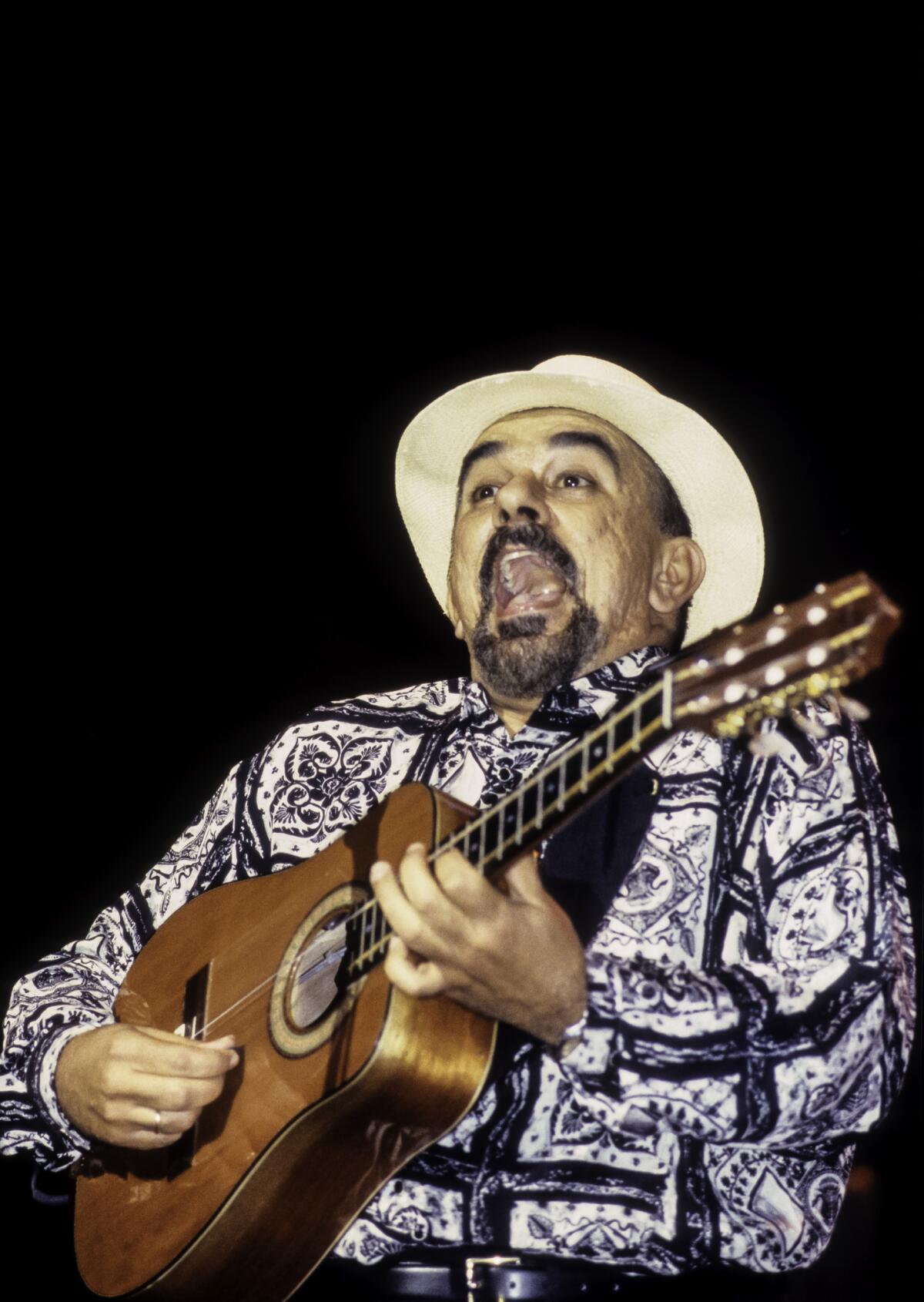How the partial closure of Havana’s U.S. embassy nearly derailed PST: LA/LA’s Cuban music festival
- Share via
Bringing artists to the U.S. is never an easy task. It’s all the more challenging when those artists live in a country under embargo by the federal government. The promoter of this weekend’s Cuban music and arts component of the arts festival Pacific Standard Time: LA / LA found that out the hard way.
A few months ago, the process of acquiring visas for more than two dozen Cuban musicians was going smoothly, said event curator Betto Arcos, who has been promoting world music performances in Los Angeles for years and hosted the “Global Village” world music program for seven years on KPFK-FM (90.7).
The musicians — hip-hop artist Telmary, Afro-Cuban jazz drummer Yissy Garcia and tres guitarist Pancho Amat, plus their bands — had submitted petitions for visas through the Department of Homeland Security. All but three of 26 applications were approved.
See the most-read stories in Entertainment this hour »
But following a mysterious series of incidents deemed “specific attacks” causing hearing loss and other unexplained illnesses for numerous Americans posted in Havana, more than 20 U.S. Embassy employees were called home from Cuba in September.
One result was that the process of granting visas slowed to a trickle.
Even though their visas had been approved, the musicians Arcos was trying to bring to Los Angeles were unable to acquire them in Havana, putting the three-day “Cuba: Antes, Ahora/Cuba: Then, Now,” festival that opens Thursday in jeopardy.
Through a series of creative moves, and with some assistance from John Feeley, the U.S. Ambassador to Panama, all three headline performers have procured their visas and will appear as scheduled at the festival’s free Friday night program, Sleepless: The Music Center After Hours, which will fill the Dorothy Chandler Pavilion with sound and visual installations, art displays, film screenings and live music, as well as at Saturday afternoon’s free Rumba Dance Party + Jam Session in Grand Park.
Garcia is bringing her regular five-piece band, Bandancha, and Amat will travel solo, performing with an L.A.-based Cuban ensemble that specializes in the same traditional son music that Amat plays at home.
“Yissy Garcia, just by chance, was on tour in Argentina, and we got them to stay a little longer,” Arcos said. That’s when he put in a call to ambassador Feeley, whom he’d met years earlier in Washington D.C., before the diplomat was appointed to his post in Panama in 2015. Feeley helped Garcia and her five-piece group get appointments at the U.S. Embassy in Buenos Aires in time to get their visas in hand before returning to Cuba.
For Telmary, who performs with an eight-piece band at home, Arcos said, “We didn’t know what we were going to do — we don’t have the money to fly to anywhere, and that’s eight people.”

Telmary, however, volunteered to use some of the fee she would get to perform in the U.S. to travel with several of her band members to Mexico. She was able to get her visa and those of about half her band from the U.S. Embassy there. She’ll perform this weekend with additional support from three L.A. musicians, two of whom are Cuban.
“The biggest news,” Arcos said last week, “is that I just got word this morning [from Feeley] that Pancho is on his way to L.A. The U.S. Consulate in Santo Domingo in the Dominican Republic has approved his visa. I just screamed with joy. He is a tower of music and has seen the entire history of the music of Cuba over the last 50 years.”
Amat, however, is coming alone, even though in Havana his band includes a guitarist, two percussionists, a bassist, two singers and a trumpeter in addition to himself on the tres, one of the signature instruments in Cuban son music.

The tres has six strings like a standard acoustic guitar, but they are strung in three pairs, each doubling notes an octave apart, akin to the more common 12-string guitar. The tres, which is native to Cuba and originated in Guantanamo, can cut through the sound of a large ensemble to add a shimmering, vibrant dimension to the overall sound.
Through a bit of serendipity, Amat will perform with an L.A.-based son ensemble led by another Cuban tres player: San Miguel, who immigrated to the U.S. years ago.
“Pancho was his teacher, and mentored him in Havana,” Arcos said. “I told him, ‘We can’t bring your band, but I want you to come. You’re the man. I really want you to be here.’ He said, ‘What am I going to do?’ I said, ‘I want you to play with San Miguel’s band.’ And he said, ‘Yeah — I’m in.’”
Each group highlights a different strand of Cuban music, fulfilling Arcos’ mission in putting a varied Cuban music and arts program together.
It opens Thursday at the Annenberg Space for Photography in Century City, which currently is featuring an exhibition about Cuba. At 7 p.m. Arcos will conduct a ‘Then, Now’ question-and-answer session with Amat, followed by L.A.-based Cuban flutist Danilo Lozano interviewing Garcia, then African American composer and musician Dexter Story in a talk with Telmary.
On Friday, all three bands will perform at the Dorothy Chandler Pavilion’s late-night session running from 11 p.m. to 3 a.m., also featuring guest DJs. Saturday’s jam session in Grand Park downtown will be led by a rumba group from Havana with appearances by Garcia, Telmary and Amat and other guests.
The festival concludes Saturday night when Cuban dance ensemble Malpaso performs at the Dorothy Chandler Pavilion with musical accompaniment from the New York-based Afro Cuban Jazz Band led by Arturo O’Farrill, whose father, Chico O’Farrill, was one of the pioneers of Afro Cuban jazz in the late 1940s, ‘50s and ‘60s.
Arturo O’Farrill also is a new Grammy nominee, picking up a nomination earlier this week for instrumental composition for his work “Three Revolutions.”
Arcos expressed disappointment over the Trump Administration’s recent decision to pull back on the steps President Obama had taken to improve relations with Cuba, following nearly 60 years of the cultural, trade and travel embargo imposed after Fidel Castro’s populist Revolution installed a communist government on the island in 1959.
“This administration has aligned itself with the conservative side of the Cuban American community, but it’s not a monolithic community,” said Arcos, who is Mexican. “The majority of Cubans living in the U.S. don’t want the embargo to continue, because they’ve seen that it doesn’t work.”
That debate is likely to continue in the years ahead, but for now, Arcos’ focus is on what’s looming this weekend.
“The main thing here is it will give people an impression of what Cuba is,” he said. “It’s much more than most people think about it, and they’re going to get a chance to see it all. It’s going to be a party.”
Cuba: Antes, Ahora / Cuba: Then, Now
When: Nov. 30 - Dec. 2
Where: The Music Center (various locations), 135 N. Grand Ave., Los Angeles
Admission: Music performances free, dance performance $87
Info: musiccenter.org/cuba
Follow @RandyLewis2 on Twitter.com
For Classic Rock coverage, join us on Facebook
The biggest entertainment stories
Get our big stories about Hollywood, film, television, music, arts, culture and more right in your inbox as soon as they publish.
You may occasionally receive promotional content from the Los Angeles Times.







